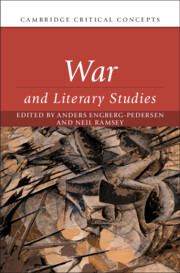Book contents
- War and Literary Studies
- Cambridge Critical Concepts
- War and Literary Studies
- Copyright page
- Contents
- Figures
- Contributors
- Acknowledgments
- Introduction: War, Literature, and the History of Knowledge
- Part I Origins and Theories
- Chapter 1 War and Ancient Athens
- Chapter 2 War and Chinese Culture
- Chapter 3 War and Romantic Thought
- Chapter 4 War and Critical Theory
- Chapter 5 War and French Theory
- Chapter 6 War and Media Studies
- Chapter 7 War and Postcolonial Studies
- Part II Foundational Concepts
- Part III Emerging Concepts
- Index
Chapter 4 - War and Critical Theory
from Part I - Origins and Theories
Published online by Cambridge University Press: 15 January 2023
- War and Literary Studies
- Cambridge Critical Concepts
- War and Literary Studies
- Copyright page
- Contents
- Figures
- Contributors
- Acknowledgments
- Introduction: War, Literature, and the History of Knowledge
- Part I Origins and Theories
- Chapter 1 War and Ancient Athens
- Chapter 2 War and Chinese Culture
- Chapter 3 War and Romantic Thought
- Chapter 4 War and Critical Theory
- Chapter 5 War and French Theory
- Chapter 6 War and Media Studies
- Chapter 7 War and Postcolonial Studies
- Part II Foundational Concepts
- Part III Emerging Concepts
- Index
Summary
The Critical Theory of the Frankfurt School was a child of total war. In the aftermath of World War I, its founding members sought to understand the new phenomenon of total mobilization, the integration of all aspects of state, society, and economy into a war effort that effectively erased traditional distinctions between war and peace. Their conception of Marxism, and the development of their critiques of mass culture and fascism, were shaped by the outcome of this effort at understanding total warfare. This chapter reconstructs the trajectory of the critical responses to total warfare in the Weimar period by the founders of Critical Theory and their counterparts on the German Right. It reviews core texts by Horkheimer and Adorno to see how their critique of mass culture in the United States and fascist mobilization in Germany are informed by their encounter with total mobilization. In its concluding section, the chapter argues that the power of this critical project came at a steep price: convinced of totalizing nature of modern warfare, critical theorists had few resources to respond to new, lower-intensity armed conflicts characteristic of decolonization struggles.
- Type
- Chapter
- Information
- War and Literary Studies , pp. 67 - 84Publisher: Cambridge University PressPrint publication year: 2023



